Europe
About Andrew Cusack
 Writer, web designer, etc.; born in New York; educated in Argentina, Scotland, and South Africa; now based in London.
Writer, web designer, etc.; born in New York; educated in Argentina, Scotland, and South Africa; now based in London. read more
News
Blogs
Reviews & Periodicals
Arts & Design
World
France
Mitteleuropa
Knickerbockers
Argentina
The Levant
Africa
Cape of Good Hope
Netherlands
Scandinavia
Québec
India
Muscovy
Germany
Academica
Articles of Note: 23.XI.2020
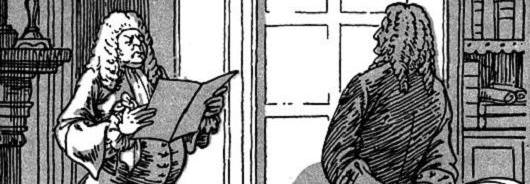
• France’s Year of de Gaulle has marked the fiftieth anniversary of his death earlier this month and what would have been the general’s one-hundred-and-thirtieth birthday yesterday. Julien Nourian has put together a Weberian analysis of the general and his charismatic mystique.
• President Trump is a very different kind of leader to de Gaulle, and his chances of continuing in the White House are not looking great at the moment. (Our head of legal in New York thinks he’s still got a chance, however.)
Regardless of who will be inaugurated in January of next year, Trump managed to win the highest proportion of minority votes of any Republican candidate since 1960 (when the GOP choice was a member of the NAACP). Meanwhile, Trump lost votes among old, white, well-to-do men.
What is the future of American political conservatism? Ben Hachten points out It’s Not Your Father’s GOP.
New England poli-sci professor Darel E. Paul explores The Future of Conservative Populism, pointing out the big increase in the Hispanic vote for Trump — especially Hispanics living in Texas along the Mexican border.
• In Britain, Ferdie Rous says the Conservative party is having difficulty reconciling the business wing of the party with our rural roots, but suggests that The writings of Lewis and Tolkien embody conservative environmentalism.
Meanwhile David Skelton asserts It was working class voters who delivered this majority – and Johnson must not abandon them now.
• Here in London we’re still in the middle of the second lockdown. Instead of following the science, governments around the world are implementing the exact opposite of effective measures to combat the pandemic. It’s The Greatest Scandal of Our Lifetime according to R.J. Quinn.
• We can always do a with a dose of Metternich and Wolfram Siemann’s 900-page doorstop has provided a chance for many to analyse the master diplomat. Ferdinand Mount examines The Prime Minister of the World.
• And finally, the Museum of Literature Ireland features an online exhibition on the American writer, speaker, reformer, and statesman Frederick Douglass’s visit to Ireland 175 years ago. (Available as Gaeilge too.)
‘Solving’ Middle Europe
Ralph Adams Cram’s First-World-War Plan for Redrawing Borders
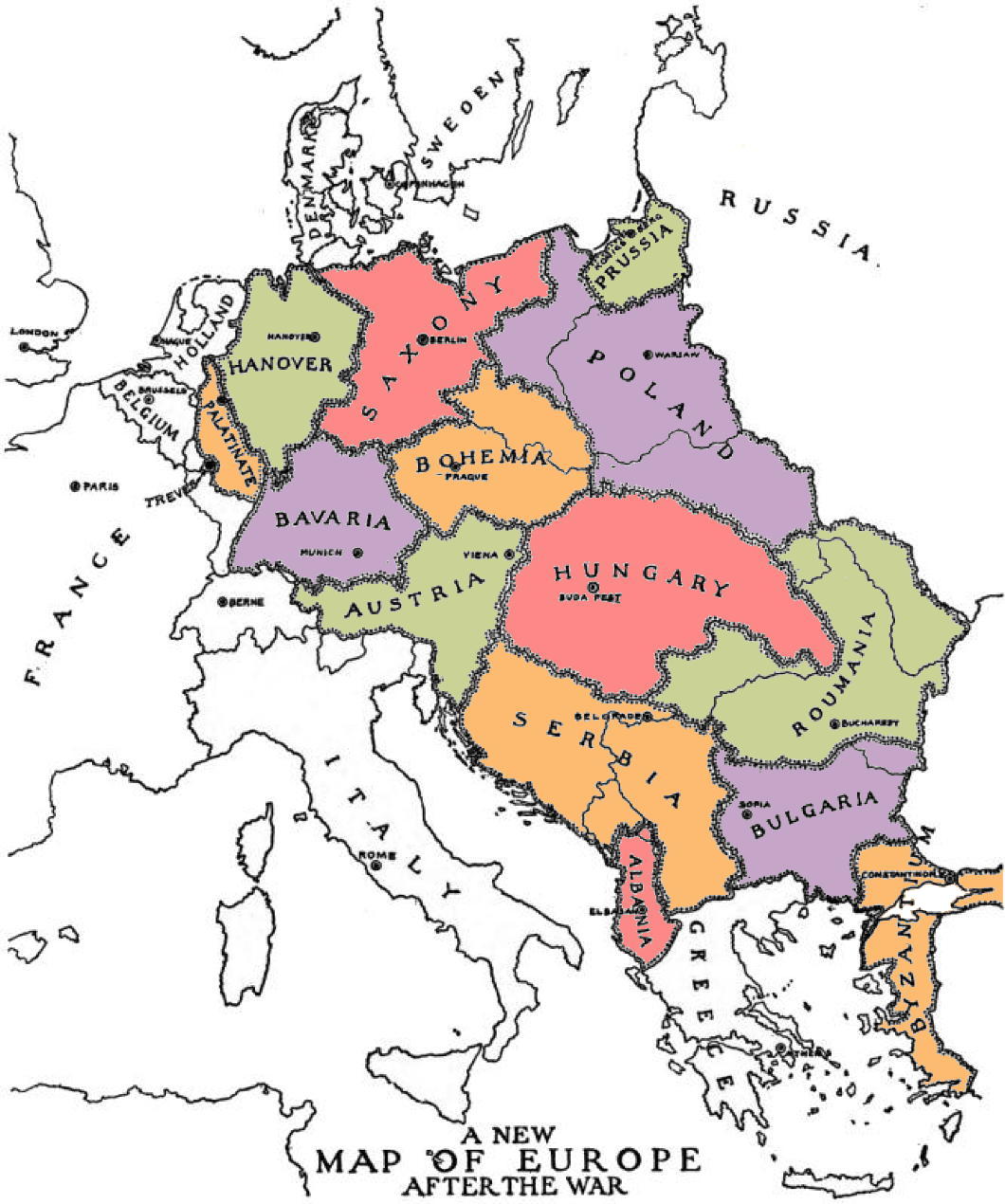
Ralph Adams Cram was not just one of the most influential American architects of the first half of the twentieth century: he was a rounded intellectual who expressed his thinking in fiction, essays, and books in addition to the buildings he designed.
Cram (and arguably even more his business partner Goodhue) had a gift for bringing the medieval to life in a way that was neither archaic nor anachronistic but instead conveyed the gothic (and other styles) as living, organic traditions into which it was perfectly legitimate for moderns to dwell, dabble, and imbibe.
His literary efforts include strange works of fiction admired by Lovecraft and political writings inviting America to become a monarchy. These have value, but it’s entirely justifiable that Cram is best known for his architectural contributions.
All the same, amidst the clamours of the First World War this architect of buildings played the architect of peoples and sketched out his idea of what Europe after the war — presuming the defeat of the Central Powers — would look like.
In A Plan for the Settlement of Middle Europe: Partition Without Annexation, Cram set out his model for the territorial redivision of central and eastern Europe “to anticipate an ending consonant with righteousness, and to consider what must be done… forever to prevent this sort of thing happening again”.
Cram, who provided a map as a general guide, predicted the return of Alsace-Lorraine to France, Schleswig-Holstein to Denmark, the Trentino and Trieste to Italy, much of Transylvania to Romania, Posen to a restored Poland, and Silesia divided in three.
Fundamental to the architect’s thinking was that “neither Germany, Austria-Hungary, nor Turkey can be permitted to exist as integral or even potential empires”. Austria and Hungary would be split and Germany needed to be partitioned (not, as some later plans had it, annexed). (more…)
The Crown of Stars
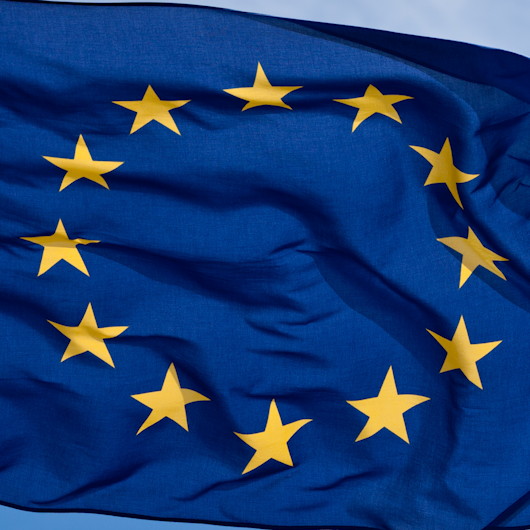
Following the horrors of the Second World War, there was a concerted effort to re-Christianise Europe, to ensure that the horrors inflicted by nationalist and Marxist socialism would never be repeated. For a time, statesmen like Konrad Adenauer in Germany and Alcide de Gasperi in Italy actually had remarkable success in promoting a Christian Democracy in which the sovereignty of Almighty God and the sanctity of human life, which carries the Image of God, were considered sacrosanct.
On the Feast of the Immaculate Conception 1955, the new flag of the European Union was inaugurated, emblazoned with twelve stars on a blue background. Its designer, Arsène Heitz, later disclosed that the stars represent the halo seen in images of Our Lady. After his first design incorporating the Cross had been rejected as too overtly Christian, Heitz was happy to take his inspiration from a picture of the Immaculate Conception.
At that time, there seemed to be so much promise for a Christian future in Europe — a future in which all human life at every stage of its existence, from conception to death, would be considered sacred and inviolable, thanks to that indelible Image of God emblazoned on every human soul.
— Fr Julian Large, Cong. Orat.
So preached the Provost of the London Oratory during a stirring sermon to, as usual, a packed church one Sunday in 2013.
Of course, as Fr Julian correctly continued, “then something seemed to go badly wrong”, but it would take a volume to transcribe the numerous missteps and mistakes in the process of attempting European political unity.
Still, one would need to be blind not to acknowledge some of its accomplishments, among which I would count the European flag the genesis of which Fr Julian describes. The design is both simple and dignified which is amply attested to by the ease with which it has been deployed to myriad purposes.
While later adopted and used by the European Union (and its predecessors, the EEC and EC) it was actually created earlier in 1955 by an entirely separate organisation, the Council of Europe. The Strasbourg-based body still holds the copyright to the European flag and includes among its members many parts of Europe and beyond that are not part of the EU, viz. Russia, Denmark’s Greenland, Turkey, and parts of the Caucasus.
As Great Britain’s membership of the European Union draws to a close, it is some reassurance that we can still claim the European flag as our own, not just vaguely as a European country, but even legally as a Council of Europe member state. Just as one mustn’t surrender the Cross of St George to be waved only by football hooligans and racists, nor must we allow the Crown of Stars to be monopolised by ‘remoaners’ with blind faith in ever-centralising and ever-more-remote institutions.
One hopes that, in time, whatever negative connotations the European flag may have had amongst some will fade into the past as Britain takes her natural place as the bridge connecting Europe and the rest of the world.
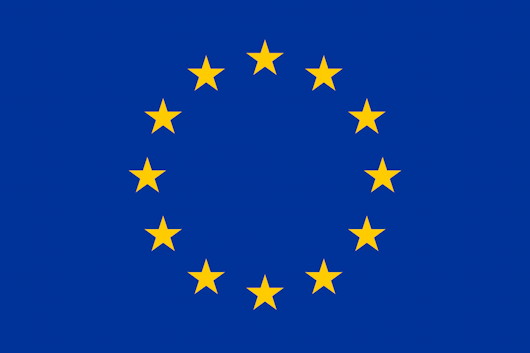
Putin: ‘I’d really like to see Europe show some real independence and sovereignty’
‘Europe is facing a specific problem: an influx of immigrants’ the Russian president asserts in an interview for Swiss television
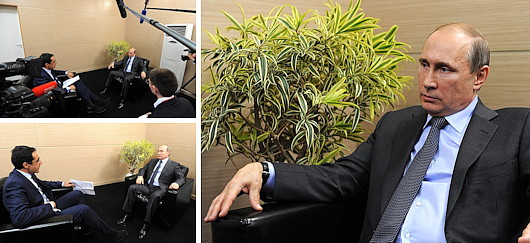
Here are a few excerpts from the interview, dealing with (among other issues) the balance of power, independence and sovereignty in Europe, and relations with the United States.
Vladimir Putin: Bonsoir.
Vladimir Putin: This is done by dishonest and inattentive people. The process of starting a new arms race began from the moment of the United States’ unilateral withdrawal from the ballistic missile defence treaty. Because this agreement was a cornerstone for the entire international security system. And when the United States withdrew from it and began to create a missile defence system as part of its global strategic weapons system, we immediately said: we will be obliged to take reciprocal steps to maintain a strategic balance of power.
I want to say something very important: we are doing this for ourselves, to ensure the security of the Russian Federation, but we are also doing it for the rest of the world, because this strategic stability ensures the balance of power.
Vladimir Putin: My mother and father. My brother, whom I never met, died here during the seige.
Vladimir Putin: I hope not. But I would really like to see Europe demonstrate some real independence and sovereignty and be capable of defending its national interests, the interests of its people and its nations. […]
Vladimir Putin: […] Participation in any military and political organisation or bloc is associated with the voluntary renunciation of a certain share of one’s sovereignty.
I think that at the time, France withdrew from NATO to preserve its sovereignty more than it is possible within the framework of a military bloc. It is not our business to analyse European nations’ foreign policy. But I think you’ll agree that if we need to discuss intra-European affairs with European partners in Washington, it is not very interesting.
Vladimir Putin: I think that this is not so much support for me as the realisation of national interests as the political parties see them.
There are certain tectonic changes underway throughout the world and in Europe within the public consciousness, which are aimed at defending national interests. You must understand that right now, Europe is facing a specific problem, an influx of immigrants. And did Europe make the decision that ultimately led to this situation? We need to be sincere and honest: these decisions were made across the ocean, but Europe must deal with the problem.
Vladimir Putin: Of course. This is just one example, but there are many. But this does not mean – and I already said this – that we should somehow demonise US policy; that is not my goal. They are conducting their policy as they see necessary in their interests.
We must strive to find a balance of interests; we need to invigorate our work, give new momentum to the work by the UN Security Council. The US is certainly a great power and the American people created this nation over several centuries, it is simply an amazing result. But that does not mean that today’s US authorities have the right to travel throughout the world and grab anyone to drag back to their prison or act from a position of “anyone who is not with us is against us.”
We need to be patient and work with our American colleagues to find solutions, the way we have in some areas of our cooperation, such as with the Iranian nuclear issue.
[…]
Vladimir Putin: After our interview, do you think I am mad?
Vladimir Putin: This is part of political struggle; it has been part of my life for quite a number of years. I try not to pay too much attention to it. I simply do what I think is necessary in the interests of my country and my people.
It is not in Russia’s interests to be in confrontation with other countries, but sometimes we are forced to protect our interests, and we will undoubtedly continue to do so. However, we will seek solution not in confrontation, particularly military confrontation, but in finding compromise and mutually acceptable solutions.
With your help I would like to address not those who criticise me, but those who support me. I would like to thank them for their support and tell them that we will continue moving ahead together. Above all, I am referring not to those who portray me [as Stalin], but to those who sympathise with what we are doing and agree with it deep inside.
Merci beaucoup.
Florence to London on Twenty Euros
THERE COMES A POINT in every young man’s life when his trust fund manager goes on holiday. It is fitting that what follows occurred during International Poverty & Homelessness Awareness Week and, certainly, I hope that my experience will raise awareness among the demographics concerned as to how they should conduct themselves.
ITALY
Let me tell you about poverty: there is poverty, there is urban poverty, and there is urbane poverty. The story of my rapid regression through these strata starts in the billionaire’s playground that is Forte dei Marmi. I had already accepted the invitation when I realised I had blown my last €30 on a bottle of Frescobaldi (I’m not a wine snob, but I only buy from friends). We had arrived in Vieri’s 1988 Posche 911 and being a Friday night in early August, Mina’s Bussola club was chocked to the gunnels with a vast array of Eurotrash. There were refugees from Biarritz, Ibiza clubbers who got rich, Moscow clubbers who fell out with Putin, abstract artists, Botox-pumped bankers wives and industrialists’ daughters from Munich and Frankfurt, all vamped up on HRT, champagne, and Prozac. It was as raucous as the bombing of Dresden, and nearly as fun. Imagine someone had pumped laughing gas into the celebrity arrivals gate at Heathrow, and you’ll get the picture. (more…)
The Swiss model
Harold James advocates scaling up small country democracy, if the members of the European Union are ever to succeed in settling upon a working model of democracy. He explains why the Swiss model of “Konkordanzdemokratie” has much to offer.
From Schweizer Monat via Eurozine.
SWISS PEOPLE TEND to regard their political, social and economic order as something quite unique, that cannot be replicated elsewhere. That is a pity. Switzerland would not only do other countries a terrific favour by exporting its political and social order; it would also help make its own existence more viable, in the midst of an environment that has become quite threatening. Exporting Swissness would be an act of self-interest and not just altruism.
The members of the European Union are in desperate need of a working model of federalism and of democracy. Are there any useful or instructive foreign models for modern Europe in its hour of need? The history of the United States has some appeal. Many Europeans now regularly cite Alexander Hamilton’s famous negotiation in 1790 of the assumption of state debts by the federal government as a model for how a United States of Europe might be created. But the actual turn of events is less than appealing. The individual states embarked on a borrowing binge in the late 1830s, that was then followed by widespread default in the early 1840s. The revenue stream that was used to service the federal debt – the external tariff – represented a necessary part of the Hamilton scheme that was also inherently and intensely conflictual, and proved to be a cause of increased tension between the American North and the South.
Situated in the heart of Europe, the Swiss experience might offer a superior example for modern Europeans. (more…)
In Defence of Orbánisation
The silent majority of Hungarians have at last found a voice in the Fidesz party – and the European Commission don’t like what they are hearing.
by ALEXANDER SHAW in Brussels
In under two years, Viktor Orbán’s regime has reduced the Hungarian budget deficit, reduced personal income taxes, returned the GDP to growth and proclaimed sovereign primacy over supranational diktats. Adopted at the beginning of this year, Fidesz’s new national constitution finally overthrows the Communist era law of 1949. Hungary is the last former East Bloc nation to have achieved this. It is hardly surprising, therefore, that 300,000 Hungarians marched to support their government when the reforms came under fire from the EU in January. It was the biggest demonstration in Hungary since the regime change. The message was clear: Fidesz’s democratic mandate is as mighty as ever and Hungarians want sovereignty. (more…)
Hungary Reasserts Sovereignty
Deputy PM Navracsics asserts to shocked Commissioner that Council of Europe “cannot impose anything which runs counter to our constitution”
Hungary yesterday declared its sovereign primacy over the EU. In a heated dialogue between Tibor Navracsics and Commissioner Neelie Kroes, the Hungarian deputy PM staidly remarked that his country would not impose legislation which was contrary to its new constitution. The packed committee room gasped in horrified awe. Kroes was visibly furious as she stormed out, expressing her usual ‘grave concerns’ about Hungary.
Kroes had obviously been banking on Navracsics’s compliance with the Council of Europe’s recommendations, EU member states being bound to comply with the Council of Europe’s Fundamental Charter of Human Rights under the Treaty of Lisbon. The Hungarian government is under scrutiny from the EU for the possible breach of various articles of the Charter. When asked directly where his priorities lay in implementing recommendations, however, the founding member of the ruling Fidesz party stated “I’m a Hungarian member of parliament and I have sworn allegiance to the constitution of Hungary.” (more…)
Europe According to Stereotype
A London-based graphic designer has created a series of maps depicting Europe according to the national stereotypes in the minds of various peoples. Yanko Tsvetkov, a Bulgarian living in Great Britain, created the first one in 2009 in the midst of the energy dispute between Russia and the Ukraine. Russia was labelled “Paranoid Oil Empire”, the Ukraine “Gas Stealers”, and the E.U. as “Union of Subsidized Farmers”. Switzerland was simply “Bank”.
“I created the first one in 2009 because at that time there was an energy crisis in Europe,” Mr. Tsvetkov said. “I just created it to amuse my friends but when I put it up on my website so many people liked it that I decided to really focus on the project of mapping the stereotypes based on different places in Europe. I was surprised by the reaction because I never really expected it to take off like this.” (more…)
Of tribes and traditions
In tribal Africa, Ghaddafi expounds traditional government; Meanwhile ethnic Romanians vote to be ruled by their German neighbours.
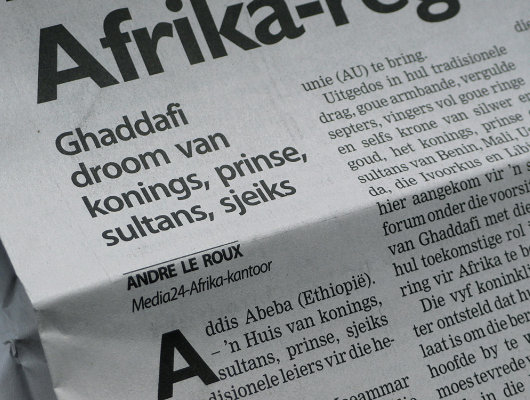
«Ghaddafi dreams of kings, princes, sultans, sheiks»
reports the Afrikaans newspaper Die Burger.
ONE OF THE LESS-REPORTED aspects of the selection of Col. Moammar al-Ghaddafi, the tent-dwelling Libyan leader and notorious eccentric, as Chairman of the African Union was his proposal that an upper house of “kings, princes, sultans, sheiks, and other traditional leaders” be added to the Pan-African Parliament. Col. Ghaddafi has been forthright in his condemnation of democracy as ill-suited to the African continent. “We don’t have any political structures [in Africa], our structures are social,” he explained to the press. Africa is essentially tribal, the argument goes, and as such multi-party democracy always develops along tribal lines, which eventually leads to tribal conflict and warfare. “That is what has led to bloodshed,” the AU chairman posited, citing the recent example of the Kenyan elections.
Europe, of course, solved the matter of tribal difficulties by brutally uprooting long-established peoples from their native lands after the Second World War and transferring them to jurisdictions in which they would ostensibly be part, not only of the majority, but of theoretically “national” states. Cities with centuries of Polish history became Soviet, towns as German as sauerkraut became Polish, and so on and so forth. Sometimes the undesired populations of multi-ethnic places were cruelly murdered, as recent revelations from the police in Bohemia have shown.
Still, remnants of the old cosmopolitan order remain. (more…)
Enda & Declan
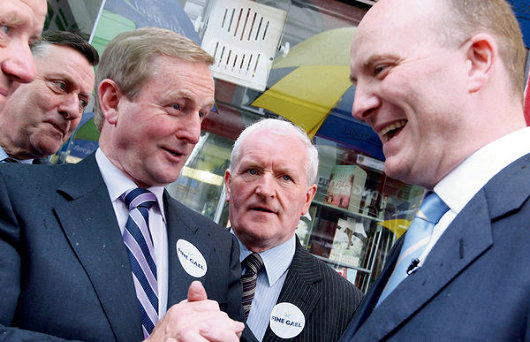
“Now you wouldn’t go scuppering this Lisbon deal we’ve got now wouldja, Mr. Ganley?” Mr. Enda Kenny of Fine Gael (left) meets Mr. Declan Ganley of Libertas (right).
While I am accused of being Fine Gael by tribe & temperament, there’s no doubting that party’s been heading in the wrong direction for several decades now. Once moderate in the face of supposed republican extremism, it is now a banal shell of its former self. (Who would Gen. Mulcahy vote for today, one wonders). Those who have the opportunity of voting in the current European elections will doubtless consider voting for Mr. Ganley’s Libertas party, which is running candidates in quite a number of EU member states, including the United Kingdom.
‘The man who walked’
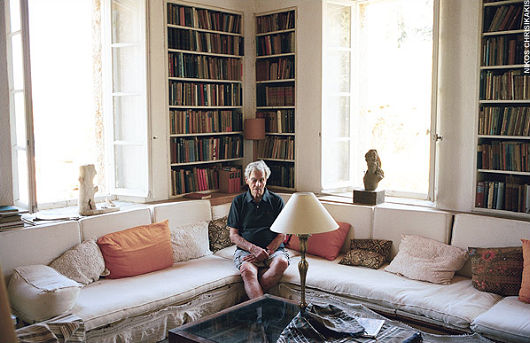
The Daily Telegraph — 6 September 2008
At 18 he left home to walk the length of Europe; at 25, as an SOE agent, he kidnapped the German commander of Crete; now at 93, Patrick Leigh Fermor, arguably the greatest living travel writer, is publishing the nearest he may come to an autobiography – and finally learning to type. William Dalrymple meets him at home in Greece
‘You’ve got to bellow a bit,’ Sir Patrick Leigh Fermor said, inclining his face in my direction, and cupping his ear. ‘He’s become an economist? Well, thank God for that. I thought you said he’d become a Communist.’
He took a swig of retsina and returned to his lemon chicken.
‘I’m deaf,’ he continued. ‘That’s the awful truth. That’s why I’m leaning towards you in this rather eerie fashion. I do have a hearing aid, but when I go swimming I always forget about it until I’m two strokes out, and then it starts singing at me. I get out and suck it, and with luck all is well. But both of them have gone now, and that’s one reason why I am off to London next week. Glasses, too. Running out of those very quickly. Occasionally, the one that is lost is found, but their numbers slowly diminish…’
He trailed off. ‘The amount that can go wrong at this age – you’ve no idea. This year I’ve acquired something called tunnel vision. Very odd, and sometimes quite interesting. When I look at someone I can see four eyes, one of them huge and stuck to the side of the mouth. Everyone starts looking a bit like a Picasso painting.’
He paused and considered for a moment, as if confronted by the condition for the first time. ‘And, to be honest, my memory is not in very good shape either. Anything like a date or a proper name just takes wing, and quite often never comes back. Winston Churchill – couldn’t remember his name last week.
‘Even swimming is a bit of a trial now,’ he continued, ‘thanks to this bloody clock thing they’ve put in me – what d’they call it? A pacemaker. It doesn’t mind the swimming. But it doesn’t like the steps on the way down. Terrific nuisance.’
We were sitting eating supper in the moonlight in the arcaded L-shaped cloister that forms the core of Leigh Fermor’s beautiful house in Mani in southern Greece. Since the death of his beloved wife Joan in 2003, Leigh Fermor, known to everyone as Leigh Fermor, has lived here alone in his own Elysium with only an ever-growing clowder of darting, mewing, paw-licking cats for company. He is cooked for and looked after by his housekeeper, Elpida, the daughter of the inn-keeper who was his original landlord when he came to Mani for the first time in 1962.
It is the most perfect writer’s house imaginable, designed and partially built by Leigh Fermor himself in an old olive grove overlooking a secluded Mediterranean bay. It is easy to see why, despite growing visibly frailer, he would never want to leave. Buttressed by the old retaining walls of the olive terraces, the whitewashed rooms are cool and airy and lined with books; old copies of the Times Literary Supplement and the New York Review of Books lie scattered around on tables between Attic vases, Indian sculptures and bottles of local ouzo.
A study filled with reference books and old photographs lies across a shady courtyard. There are cicadas grinding in the cypresses, and a wonderful view of the peaks of the Taygetus falling down to the blue waters of the Aegean, which are so clear it is said that in some places you can still see the wrecks of Ottoman galleys lying on the seabed far below.
There is a warm smell of wild rosemary and cypress resin in the air; and from below comes the crash of the sea on the pebbles of the foreshore. Yet there is something unmistakably melancholy in the air: a great traveller even partially immobilised is as sad a sight as an artist with failing vision or a composer grown hard of hearing.
I had driven down from Athens that morning, through slopes of olives charred and blackened by last year’s forest fires. I arrived at Kardamyli late in the evening. Although the area is now almost metropolitan in feel compared to what it was when Leigh Fermor moved here in the 1960s (at that time he had to move the honey-coloured Taygetus stone for his house to its site by mule as there was no road) it still feels wonderfully remote and almost untouched by the modern world.
When Leigh Fermor first arrived in Mani in 1962 he was known principally as a dashing commando. At the age of 25, as a young agent of Special Operations Executive (SOE), he had kidnapped the German commander in Crete, General Kreipe, and returned home to a Distinguished Service Order and movie version of his exploits, Ill Met by Moonlight (1957) with Dirk Bogarde playing him as a handsome black-shirted guerrilla.
It was in this house that Leigh Fermor made the startling transformation – unique in his generation – from war hero to literary genius. To meet, Leigh Fermor may still have the speech patterns and formal manners of a British officer of a previous generation; but on the page he is a soaring prose virtuoso with hardly a single living equal.
It was here in the isolation and beauty of Kardamyli that Leigh Fermor developed his sublime prose style, and here that he wrote most of the books that have made him widely regarded as the world’s greatest travel writer, as well as arguably our finest living prose-poet. While his densely literary and cadent prose style is beyond imitation, his books have become sacred texts for several generations of British writers of non-fiction, including Bruce Chatwin, Colin Thubron, Philip Marsden, Nicholas Crane and Rory Stewart, all of whom have been inspired by the persona he created of the bookish wanderer: the footloose scholar in the wilds, scrambling through remote mountains, a knapsack full of books on his shoulder.
Germany carved amongst her neighbours
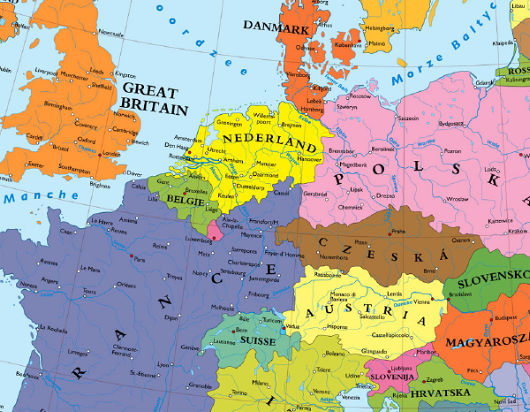
What is this cartographic madness? Hanover part of the Netherlands? Kassel ruled by France? Nuremburg part of a Bohemia that reaches to the Frankfurt suburbs? Hamburg in Denmark? Regensburg on the Austro-Czech border? I came across the company Kalimedia in an article from Die Zeit a month or two ago and discovered their map of a Europe without a Germany. Believe it or not, there were plans of one sort or another to achieve similar results at the end of the Second World War. The major plan for the dissection of Germany was merely a creation of Nazi propaganda, and while the vaguely similar Morgenthau Plan did exist, it was soon shelved once its impracticality became obvious.
The Bakker-Schut Plan, meanwhile, was a Dutch proposal for the annexation of several German towns, and perhaps even a number of German cities. German natives would be expelled, except for those who spoke the Low Franconian dialect, who would be forcibly dutchified. They even came up with a list of new Dutch names for German cities: c.f. the post at Strange Maps on “Eastland, Our Land: Dutch Dreams of Expansion at Germany’s Expense”.
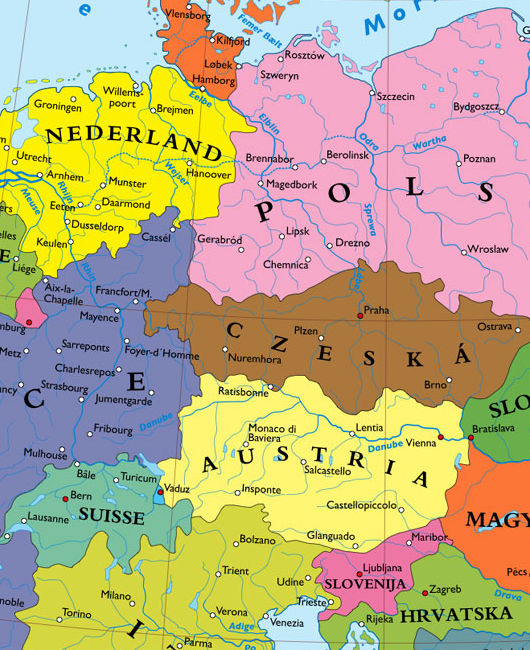
Stat Belgium, stat Europa

Buttiglione: ‘Here I Am’
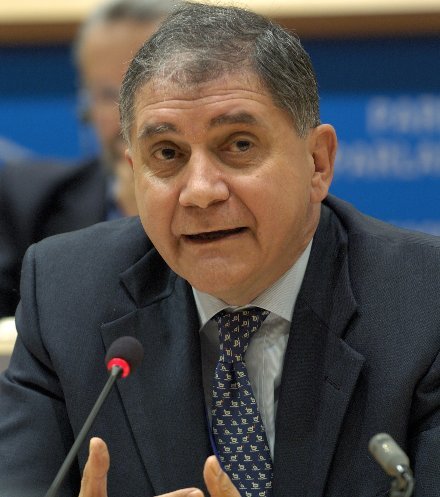
Rocco Buttiglione has announced plans to found a movement to campaign for Christian values in the European public sphere. For my friends on the home side of the pond who haven’t been keeping up with the Buttiglione controversy, here’s the gist: (more…)
Search
Instagram: @andcusack
Click here for my Instagram photos.Most Recent Posts
- How to Make a Pope April 24, 2025
- Faithful Shepherd of the Falklands April 8, 2025
- Articles of Note: 8 April 2025 April 8, 2025
- Proportionality Destroys Representation April 8, 2025
- Sag Harbor Cinema March 26, 2025
Most Recent Comments
Book Wishlist
Monthly Archives
Categories


